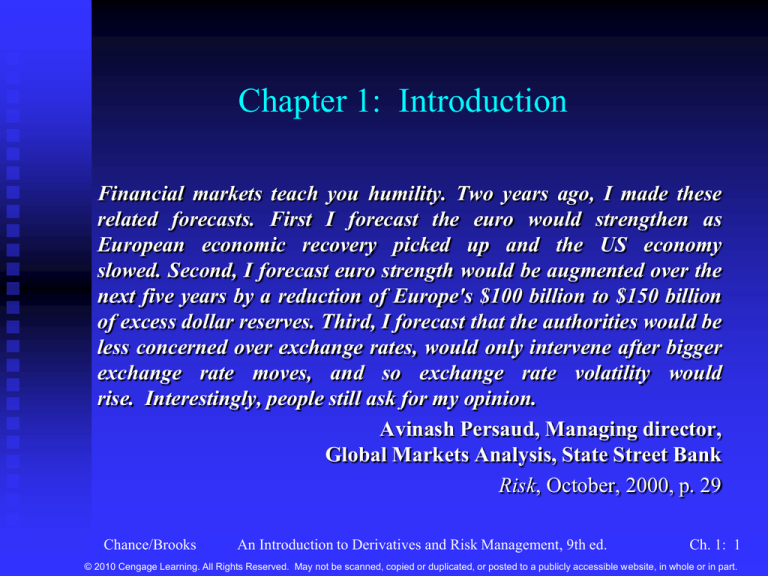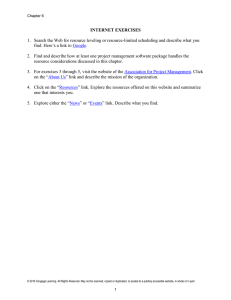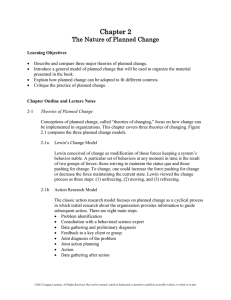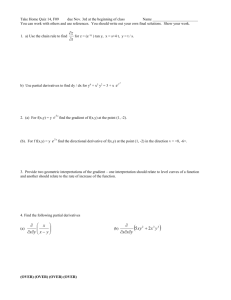
Chapter 1: Introduction
Financial markets teach you humility. Two years ago, I made these
related forecasts. First I forecast the euro would strengthen as
European economic recovery picked up and the US economy
slowed. Second, I forecast euro strength would be augmented over the
next five years by a reduction of Europe's $100 billion to $150 billion
of excess dollar reserves. Third, I forecast that the authorities would be
less concerned over exchange rates, would only intervene after bigger
exchange rate moves, and so exchange rate volatility would
rise. Interestingly, people still ask for my opinion.
Avinash Persaud, Managing director,
Global Markets Analysis, State Street Bank
Risk, October, 2000, p. 29
Chance/Brooks
An Introduction to Derivatives and Risk Management, 9th ed.
Ch. 1: 1
© 2010 Cengage Learning. All Rights Reserved. May not be scanned, copied or duplicated, or posted to a publicly accessible website, in whole or in part.
Important Concepts in Chapter 1
Different types of derivatives
Presuppositions for financial markets, risk preferences,
risk-return tradeoff, and market efficiency
Theoretical fair value
Arbitrage, storage, and delivery
The role of derivative markets
Criticisms of derivatives
Ethics
Chance/Brooks
An Introduction to Derivatives and Risk Management, 9th ed.
Ch. 1: 2
© 2010 Cengage Learning. All Rights Reserved. May not be scanned, copied or duplicated, or posted to a publicly accessible website, in whole or in part.
Business risk vs. financial risk
Derivatives
A derivative is a financial instrument whose return is
derived from the return on another instrument.
Size of the OTC derivatives market at year-end 2010
$601 trillion notional principal
GDP is only $15 trillion
See Figure 1.1 and Figure 1.2
Real vs. financial assets
Chance/Brooks
An Introduction to Derivatives and Risk Management, 9th ed.
Ch. 1: 3
© 2010 Cengage Learning. All Rights Reserved. May not be scanned, copied or duplicated, or posted to a publicly accessible website, in whole or in part.
Derivative Markets and Instruments
Derivative Markets
Over-the-counter and exchange traded
Exchange traded derivatives volume in 2010 was over
22 billion contracts on at least 78 derivatives
exchanges, according to Futures Industry magazine (a
leading source of derivatives industry information
Derivatives trade all over the world
See Table 1.1 for the top ten derivatives exchanges
Chance/Brooks
An Introduction to Derivatives and Risk Management, 9th ed.
Ch. 1: 4
© 2010 Cengage Learning. All Rights Reserved. May not be scanned, copied or duplicated, or posted to a publicly accessible website, in whole or in part.
Derivative Markets and Instruments
Options
Definition: a contract between two parties that gives
one party, the buyer, the right to buy or sell something
from or to the other party, the seller, at a later date at a
price agreed upon today
Option terminology
price/premium
call/put
exchange-listed vs. over-the-counter options
Chance/Brooks
An Introduction to Derivatives and Risk Management, 9th ed.
Ch. 1: 5
© 2010 Cengage Learning. All Rights Reserved. May not be scanned, copied or duplicated, or posted to a publicly accessible website, in whole or in part.
Derivative Markets and Instruments
(continued)
Forward Contracts
Definition: a contract between two parties for one
party to buy something from the other at a later date at
a price agreed upon today
Exclusively over-the-counter
Chance/Brooks
An Introduction to Derivatives and Risk Management, 9th ed.
Ch. 1: 6
© 2010 Cengage Learning. All Rights Reserved. May not be scanned, copied or duplicated, or posted to a publicly accessible website, in whole or in part.
Derivative Markets and Instruments
(continued)
Futures Contracts
Definition: a contract between two parties for one
party to buy something from the other at a later date at
a price agreed upon today; subject to a daily settlement
of gains and losses and guaranteed against the risk that
either party might default
Exclusively traded on a futures exchange
Chance/Brooks
An Introduction to Derivatives and Risk Management, 9th ed.
Ch. 1: 7
© 2010 Cengage Learning. All Rights Reserved. May not be scanned, copied or duplicated, or posted to a publicly accessible website, in whole or in part.
Derivative Markets and Instruments
(continued)
Options on Futures (also known as commodity options or
futures options)
Definition: a contract between two parties giving one
party the right to buy or sell a futures contract from the
other at a later date at a price agreed upon today
Exclusively traded on a futures exchange
Chance/Brooks
An Introduction to Derivatives and Risk Management, 9th ed.
Ch. 1: 8
© 2010 Cengage Learning. All Rights Reserved. May not be scanned, copied or duplicated, or posted to a publicly accessible website, in whole or in part.
Derivative Markets and Instruments
(continued)
Swaps and Other Derivatives
Definition of a swap: a contract in which two parties
agree to exchange a series of cash flows
Exclusively over-the-counter
Other types of derivatives include swaptions and
hybrids. Their creation is a process called financial
engineering.
The Underlying Asset
Called the underlying
A derivative derives its value from the underlying.
Chance/Brooks
An Introduction to Derivatives and Risk Management, 9th ed.
Ch. 1: 9
© 2010 Cengage Learning. All Rights Reserved. May not be scanned, copied or duplicated, or posted to a publicly accessible website, in whole or in part.
Some Important Concepts in Financial and
Derivative Markets
Presuppositions – rule of law, property rights, culture of
trust
Risk Preference
Risk aversion vs. risk neutrality
Risk premium
Short Selling
Repurchase agreements (repos)
Return and Risk
Risk defined
The risk-return tradeoff (see Figure 1.3)
Chance/Brooks
An Introduction to Derivatives and Risk Management, 9th ed.
Ch. 1: 10
© 2010 Cengage Learning. All Rights Reserved. May not be scanned, copied or duplicated, or posted to a publicly accessible website, in whole or in part.
Some Important Concepts in Financial and
Derivative Markets (continued)
Market Efficiency and Theoretical Fair Value
Efficient market defined: A market in which the price of
an asset equals its true economic value.
An efficient market is a consequence of rational and
knowledgeable investor behavior
The concept of theoretical fair value
The true economic value
Chance/Brooks
An Introduction to Derivatives and Risk Management, 9th ed.
Ch. 1: 11
© 2010 Cengage Learning. All Rights Reserved. May not be scanned, copied or duplicated, or posted to a publicly accessible website, in whole or in part.
Fundamental Linkages Between Spot and
Derivative Markets
Arbitrage and the Law of One Price
Arbitrage defined: A type of profit-seeking transaction
where the same good trades at two prices.
Example: See Figure 1.4
The concept of states of the world
The Law of One Price
The Storage Mechanism: Spreading Consumption across
Time
Delivery and Settlement
Chance/Brooks
An Introduction to Derivatives and Risk Management, 9th ed.
Ch. 1: 12
© 2010 Cengage Learning. All Rights Reserved. May not be scanned, copied or duplicated, or posted to a publicly accessible website, in whole or in part.
The Role of Derivative Markets
Risk Management
Hedging vs. speculation
Setting risk to an acceptable level
Example: Southwest Airlines
Price Discovery
Operational Advantages
Transaction costs
Liquidity
Ease of short selling
Market Efficiency
Chance/Brooks
An Introduction to Derivatives and Risk Management, 9th ed.
Ch. 1: 13
© 2010 Cengage Learning. All Rights Reserved. May not be scanned, copied or duplicated, or posted to a publicly accessible website, in whole or in part.
Criticisms of Derivative Markets
Speculation
Comparison to gambling
Chance/Brooks
An Introduction to Derivatives and Risk Management, 9th ed.
Ch. 1: 14
© 2010 Cengage Learning. All Rights Reserved. May not be scanned, copied or duplicated, or posted to a publicly accessible website, in whole or in part.
Misuses of Derivatives
High leverage
Inappropriate use
Chance/Brooks
An Introduction to Derivatives and Risk Management, 9th ed.
Ch. 1: 15
© 2010 Cengage Learning. All Rights Reserved. May not be scanned, copied or duplicated, or posted to a publicly accessible website, in whole or in part.
Derivatives and Ethics
Codes of ethics and standards of professional conduct are
vital components of the derivatives profession
Examples
CFA Institute
Professional Risk Managers International Association
Global Association of Risk Professionals
Chance/Brooks
An Introduction to Derivatives and Risk Management, 9th ed.
Ch. 1: 16
Derivatives and Your Career
Financial management in a business
Small businesses ownership
Investment management
Public service
Source of Information on Derivatives
http://www.cengage.com/finance/chance
Summary
Chance/Brooks
An Introduction to Derivatives and Risk Management, 9th ed.
Ch. 1: 17
© 2010 Cengage Learning. All Rights Reserved. May not be scanned, copied or duplicated, or posted to a publicly accessible website, in whole or in part.
(Return to text slide)
Chance/Brooks
An Introduction to Derivatives and Risk Management, 9th ed.
Ch. 1: 18
© 2010 Cengage Learning. All Rights Reserved. May not be scanned, copied or duplicated, or posted to a publicly accessible website, in whole or in part.
(Return to text slide)
Chance/Brooks
An Introduction to Derivatives and Risk Management, 9th ed.
Ch. 1: 19
© 2010 Cengage Learning. All Rights Reserved. May not be scanned, copied or duplicated, or posted to a publicly accessible website, in whole or in part.
(Return to text slide)
Chance/Brooks
An Introduction to Derivatives and Risk Management, 9th ed.
Ch. 1: 20
© 2010 Cengage Learning. All Rights Reserved. May not be scanned, copied or duplicated, or posted to a publicly accessible website, in whole or in part.
(Return to text slide)
Chance/Brooks
An Introduction to Derivatives and Risk Management, 9th ed.
Ch. 1: 21
© 2010 Cengage Learning. All Rights Reserved. May not be scanned, copied or duplicated, or posted to a publicly accessible website, in whole or in part.
(Return to text slide)
Chance/Brooks
An Introduction to Derivatives and Risk Management, 9th ed.
Ch. 1: 22
© 2010 Cengage Learning. All Rights Reserved. May not be scanned, copied or duplicated, or posted to a publicly accessible website, in whole or in part.








